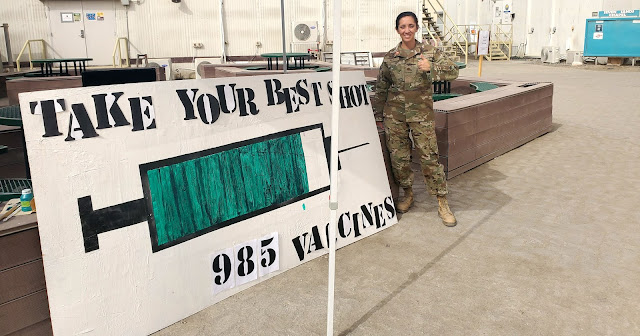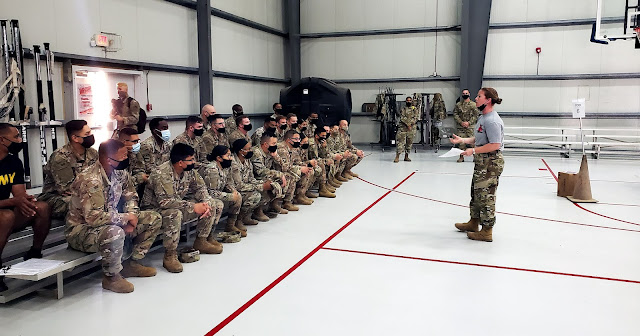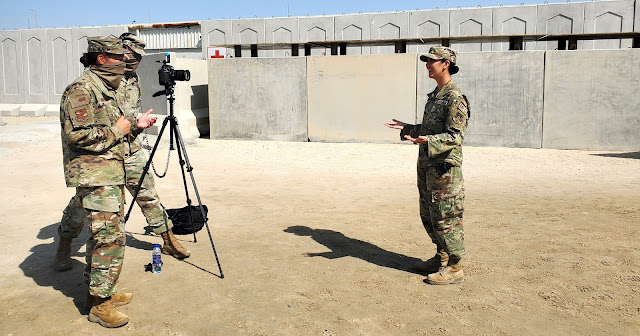COVID Education Program Led By USU Graduates Yields Increased Vaccination Rates in Deployed Troops
By Ian Neligh
While the number of people receiving COVID-19 vaccinations slows nationwide, a Uniformed Services University of the Health Sciences (USU) alumna helped institute one way to successfully get shots in arms.
Air Force Lt. Col. (Dr.) Jeanmarie Rey, a 2009 graduate of USU’s Hebert School of Medicine, participated in a benchmark plan to get military personnel vaccinated, which was so successful it became the largest vaccination effort in the United States Central Command’s area of operation.
Rey, a family physician, helped oversee an effort where more than 1,300 individuals were vaccinated in less than 48 hours, moving the acceptance rate for vaccinations from 39 to 62 percent with zero impact on combat operations. She credited the leadership and teamwork of the people she served for its success.
Now an assistant professor at USU, Rey served at Al Dhafra Air Base in the United Arab Emirates from
October 2020 to April 2021 as Chief of Medical Staff for the 380th Expeditionary Medical Group and 380th Air Expeditionary Wing.
According to Rey, the successful plan to vaccinate military personnel against COVID-19 came down to communication and by providing education, town hall-style meetings, and having frank discussions with Airmen, Soldiers, Sailors, and Marines.
She said what complicated matters was some weren’t initially confident in the vaccine. However, at the time of her deployment, two active duty service members on their base had become severely sick with COVID and the region surrounding them in the United Arab Emirates had become a hotbed for the virus. Those in contact with the infected are tracked down for quarantine, sometimes affecting as many as ten servicemembers for each person with COVID symptoms.
“That can bring down an entire operational unit, very quickly,” Rey said. It was going to become a race for education before the vaccine arrived.
Rey said an email was sent to commanders asking them to poll their people anonymously to avoid stigmatizing those that didn’t want the vaccine. She said it soon became clear that vaccination confidence rates varied greatly by unit. This allowed the medical group to estimate what the vaccine uptake rate would be and to target their educational interventions with more precision.
“I always talk about how, if you look at history, the things that have saved the most lives in medicine are access to clean water and vaccinations — by far.” - Air Force Lt. Col. Jeanmarie Rey
With that in mind, Rey and her staff developed a plan to provide accurate information and education to the base’s personnel so they could make an informed decision.
“The challenge was convincing people it was worth their while to get the vaccine,” Rey said. “Just like at home when you tell an American you have to do something the normal response is ‘why?’ We want to know, and we’re very information-driven and there is a lot of disinformation out there.”
As part of this effort, Rey personally met with soldiers getting off work, traveled across the base, and met with her audience at all hours of the day.
“There was a lot of logistical planning so I could get down to the flight line, so I could brief them at the warehouse because that’s when they had a break in their shift,” Rey said. “We did many briefs and town halls where we took hardball questions and created an open and safe environment so that soldiers could share the information.”
She said it was important to do the education face-to-face with the troops, letting them know that it was important enough for her to meet with them at any time of the day that worked for their schedule. Rey said they often then had vigorous discussions based on mutual respect and a shared appreciation of the uncertainty that surrounds both the COVID vaccine and COVID illness itself.
“I gave a historical perspective because I’ve found that is very impactful,” Rey said. “I always talk about how, if you look at history, the things that have saved the most lives in medicine are access to clean water and vaccinations — by far.”
Afterward, she would meet with soldiers one on one to address their concerns, fears, or questions about the vaccine.
Besides the education, Rey said her team adopted a strategy of making it mandatory for all service members to show up in person for vaccine education and to be offered the vaccine. Those who did not want the vaccine could easily opt out and the team was able to document that the soldier had been offered it and declined.
“At least then we can say we provided them with accurate information and then they can make their own decision,” Rey said. However, Rey adds the effort to continue to spread accurate information so that military personnel can make educated choices about the COVID-19 vaccine is an ongoing effort.
“It’s all very dependent on people, timing, and skill sets,” Rey said. “… It’s a hill we’ll need to keep climbing with all the change and turnover that is inherent in military medicine.”
Rey added during the deployment she ended up working with fellow USU alum, 2009 classmate and family medicine physician Air Force Lt. Col. (Dr.) Gary D’Orazio.
“Together we served as physician leaders to our line commanders during the great uncertainty of COVID,” Rey said. “(D’Orazio) and I were able to serve together during a time that our primary care skill set was highly needed to help fight the COVID-19 pandemic downrange. Our education at USU and family medicine residency training prepared us well for this challenge.”







